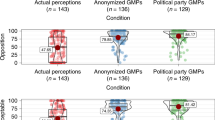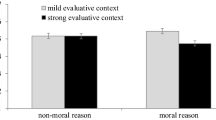Abstract
The present research examined how the social category of a target (i.e., in-group versus out-group member) influences the nature of counterfactual thoughts people generate about the target. In Experiment 1, we found a marginally significant interaction effect such that participants generated more target-focused counterfactuals in response to a negative outcome that involved an in-group than an out-group target when the outcome was mildly negative, whereas this difference did not emerge when the outcome was severely negative. In Experiment 2, provision of an opportunity to affirm an important aspect of one’s self-concept allowed participants to generate more target-focused counterfactuals for an in-group than an out-group target, even when the outcome was severely negative. By contrast, participants in the non-affirmation condition did not show such a difference. Taken together, these results suggest that counterfactual thinking about others can be directed by self-related motives (i.e., self-preparative and self-protective motives) associated with the effects of social categorization and the severity of the negative outcome.


Similar content being viewed by others
References
Branscombe, N. R., Wohl, M. J. A., Owen, S., Allison, J. A., & N’Gbala, A. (2003). Counterfactual thinking, blame assignment, and well-being in rape victims. Basic and Applied Social Psychology, 25, 265–273. https://doi.org/10.1207/S15324834BASP2504_1.
Brewer, M. B., & Gardner, W. L. (1996). Who is this “we”? Levels of collective identity and self-representations. Journal of Personality and Social Psychology, 71, 83–93. https://doi.org/10.1037/0022-3514.71.1.83.
Campbell, W. K., & Sedikides, C. (1999). Self-threat magnifies the self-serving bias: a meta-analytic integration. Review of General Psychology, 3, 23–43.
Cialdini, R. B., Borden, R. J., Thorne, A., Walker, M. R., Freeman, S., & Sloan, L. R. (1976). Basking in reflected glory: three (football) field experiments. Journal of Personality and Social Psychology, 34, 366–375. https://doi.org/10.1037/0022-3514.34.3.366.
Dyczewski, E. A., & Markman, K. D. (2012). General attainability beliefs moderate the motivational effects of counterfactual thinking. Journal of Experimental Social Psychology, 48, 1217–1220. https://doi.org/10.1016/j.jesp.2012.04.016.
Epstude, K., & Roese, N. J. (2008). The functional theory of counterfactual thinking. Personality and Social Psychology Review, 12, 168–192. https://doi.org/10.1177/1088868308316091.
Festinger, L. (1954). A theory of social comparison processes. Human Relations, 7, 117–140.
Gardner, W. L., Gabriel, S., & Hochschild, L. (2002). When you and I are “we”, you are not threatening: the role of self-expansion in social comparison. Journal of Personality and Social Psychology, 82, 239–251. https://doi.org/10.1037/0022-3514.82.2.239.
Harris, P. R., & Epton, T. (2009). The impact of self-affirmation on health cognition, health behaviour and other health-related responses: a narrative review. Social and Personality Psychology Compass, 3, 962–978. https://doi.org/10.1111/j.1751-9004.2009.00233.x.
Markman, K. D., & McMullen, M. N. (2003). A reflection and evaluation model of comparative thinking. Personality and Social Psychology Review, 7, 244–267. https://doi.org/10.1207/S15327957PSPR0703_04.
Markman, K. D., Gavanski, I., Sherman, S. J., & McMullen, M. N. (1993). The mental simulation of better and worse possible worlds. Journal of Experimental Social Psychology, 29, 87–109. https://doi.org/10.1006/jesp.1993.1005.
Markman, K. D., Gavanski, I., Sherman, S. J., & McMullen, M. N. (1995). The impact of perceived control on the imagination of better and worse possible worlds. Personality and Social Psychology Bulletin, 21, 588–595.
Markman, K. D., McMullen, M. N., & Elizaga, R. A. (2008). Counterfactual thinking, persistence and performance: a test of the reflection and evaluation model. Journal of Experimental Social Psychology, 44, 421–428. https://doi.org/10.1016/j.jesp.2007.01.001.
McCloy, R., & Byrne, R. M. J. (2000). Counterfactual thinking about controllable events. Memory & Cognition, 28, 1071–1078. https://doi.org/10.3758/BF03209355.
McCrea, S. M. (2007). Counterfactual thinking following negative outcomes: evidence for group and self-protective biases. European Journal of Social Psychology, 37, 1256–1271. https://doi.org/10.1002/ejsp.462.
McGarty, C., & Penny, R. E. C. (1988). Categorization, accentuation and social judgement. British Journal of Social Psychology, 27, 147–157. https://doi.org/10.1111/j.2044-8309.1988.tb00813.x.
McQueen, A., & Klein, W. M. P. (2006). Experimental manipulations of self-affirmation: a systematic review. Self and Identity, 5, 289–354. https://doi.org/10.1080/15298860600805325.
Medvec, V. H., Madey, S. F., & Gilovich, T. D. (1995). When less is more: counterfactual thinking and satisfaction among Olympic athletes. Personality and Social Psychology Bulletin, 69, 603–610. https://doi.org/10.1037/0022-3514.69.4.603.
Meyers-Levy, J., & Maheswaran, D. (1992). When timing matters: the influence of temporal distance on consumers’ affective and persuasive responses. Journal of Consumer Research, 19, 424–433. https://doi.org/10.1086/209312.
Myers, A. L., McCrea, S. M., & Tyser, M. P. (2014). The role of thought-content and mood in the preparative benefits of upward counterfactual thinking. Motivation and Emotion, 38, 166–182.
Nasco, S. A., & Marsh, K. L. (1999). Gaining control through counterfactual thinking. Personality and Social Psychology Bulletin, 25, 557–569. https://doi.org/10.1177/0146167299025005002.
Roese, N. J. (1994). The functional basis of counterfactual thinking. Journal of Personality and Social Psychology, 66, 805–818. https://doi.org/10.1037/0022-3514.66.5.805.
Roese, N. J. (1997). Counterfactual thinking. Psychological Bulletin, 121, 133–148. https://doi.org/10.1037/0033-2909.121.1.133.
Roese, N. J., & Olson, J. M. (1995). Counterfactual thinking: A critical overview. In N. J. Roese & J. M. Olson (Eds.), What might have been: The social psychology of counterfactual thinking (pp. 1–55). Mahwah: Lawrence Erlbaum.
Scholl, A., & Sassenberg, K. (2014). Where could we stand if I had…? How social power impacts counterfactual thinking after failure. Journal of Experimental Social Psychology, 53, 51–61. https://doi.org/10.1016/j.jesp.2014.02.005.
Sherman, D. A. K., Nelson, L. D., & Steele, C. M. (2000). Do messages about health risks threaten the self? Increasing the acceptance of threatening health messages via self-affirmation. Personality and Social Psychology Bulletin, 26, 1046–1058. https://doi.org/10.1177/01461672002611003.
Smallman, R., & Roese, N. J. (2009). Counterfactual thinking facilitates behavioral intentions. Journal of Experimental Social Psychology, 45, 845–852. https://doi.org/10.1016/j.jesp.2009.03.002.
Tal-Or, N., Boninger, D. S., & Gleicher, F. (2004). On becoming what we might have been: counterfactual thinking and self-efficacy. Self and Identity, 3, 5–26.
Turner, J. C., Hogg, M. A., Oakes, P. J., Reicher, S., & Wetherell, M. S. (1987). Rediscovering the social group: A self-categorization theory. Oxford: Blackwell.
Tykocinski, O. E., & Steinberg, N. (2005). Coping with disappointing outcomes: retroactive pessimism and motivated inhibition of counterfactuals. Journal of Experimental Social Psychology, 41, 551–558. https://doi.org/10.1016/j.jesp.2004.12.001.
Tyser, M. P., McCrea, S. M., & Knüpfer, K. (2012). Pursuing perfection or pursuing protection? Self-evaluation motives moderate the behavioral consequences of counterfactual thoughts. European Journal of Social Psychology, 42, 372–382. https://doi.org/10.1002/ejsp.1864.
White, K., & Lehman, D. R. (2005). Looking on the bright side: downward counterfactual thinking in response to negative life events. Personality and Social Psychology Bulletin, 31, 1413–1424. https://doi.org/10.1177/0146167205276064.
Yzerbyt, V. Y., Dumont, M., Wigboldus, D., & Gordijn, E. (2003). I feel for us: the impact of categorization and identification on emotions and action tendencies. British Journal of Social Psychology, 42, 533–549. https://doi.org/10.1348/014466603322595266.
Acknowledgements and Funding
The authors received no financial support for the research, authorship, and publication of this article.
Author information
Authors and Affiliations
Corresponding author
Ethics declarations
Ethical Approval
All procedures performed in studies involving human participants were in accordance with the ethical standards of the institutional research committee in the Department of Psychology at Sungkyunkwan University with the 1964 Helsinki declaration and its later amendments or comparable ethical standards.
Informed Consent
Informed consent was obtained from all individual participants included in the study.
Conflict of Interest
On behalf of all authors, the corresponding author states that there is no conflict of interest.
Appendix
Appendix
Dong-Su Kim (male)/Yoon-Ji Kim (female) (Katou (male)/Akiko (female), a student at Sungkyunkwan University (a student at a well-known private university in Japan), was surfing on the Internet for his winter vacation trip to a domestic city [to New York City]. One day during midterm exam week, he/she accessed a website that offered discount flight tickets and found a very cheap ticket for his/her trip. However, thinking that he/she should be more focused on the impending midterm exams, he/she decided to wait and purchase the ticket after midterms. Later, as the planned departure day approached, Dong-Su/Yoon-Ji (Katou/Akiko) searched for a cheap flight ticket again, but because by this time all the cheap tickets were gone, he/she had to purchase a much more expensive ticket than the one he/she had previously found.
On the night of December 25, 2009, three days before departure, Dong-Su/Yoon-Ji (Katou/Akiko) was listening to his/her favorite radio show on the Internet. While enjoying the show, he/she accessed a reservation webpage to check his/her itinerary and saw instructions for how to issue an e-ticket to oneself in advance. Just at the moment that he/she was reading the instructions, however, one of Dong-Su’s/Yoon-Ji’s (Katou’s/Akiko’s) favorite songs began playing on the radio. Distracted, Dong-Su/Yoon-Ji (Katou/Akiko) closed his/her eyes and listened to the song, thinking that he/she could take care of the e-ticket sometime later.
On departure day, December 28, Dong-Su/Yoon-Ji (Katou/Akiko) woke up at 9 A.M., later than when he/she had originally intended because he/she had forgot to set an alarm the night before. Realizing that he/she did not have time a lot of time, he/she hurried to pack his/her bag and left his/her home. It was snowing outside and Dong-Su/Yoon-Ji (Katou/Akiko) took a taxi to the airport. However, the taxi soon became stuck in heavy traffic because of an accident on the highway, and the traffic added an additional 30 min to his/her trip to the airport. While sitting in traffic, Dong-Su/Yoon-Ji (Katou/Akiko) became anxious and hoped that the weather would get worse so that his/her flight could be canceled or delayed.
As soon as he/she arrived at the airport, Dong-Su/Yoon-Ji (Katou/Akiko) rushed to a ticketing counter. In spite of the heavy snow, the plane had taken off as scheduled, and Dong-Su/Yoon-Ji (Katou/Akiko) arrived at the ticketing desk just 8 min after take-off. Dong-Su/Yoon-Ji (Katou/Akiko) appealed his/her situation to the ticketing agent and requested an alternate flight. Nevertheless, he/she was told that there would be no flights available for a week and that his/her unused ticket would not be refunded. Frustrated and disappointed, he/she thought to himself/herself, “I have no ticket, I lost 70[3,000] dollars, and my vacation is ruined.” [Even worse, Dong-Su/Yoon-Ji (Katou/Akiko) had promised to submit a model for a building to a company in New York City for his/her best friend’s job application, and he/she now realized that it would not be submitted before the deadline. Dong-Su’s/Yoon-Ji’s (Katou’s/Akiko’s) friend was one of the finalists for a high-level position at a world-class construction company. His/Her friend had asked Dong-Su/Yoon-Ji (Katou/Akiko) to perform the errand because his/her friend was worried about the damages that might incur if he/she used a delivery service. As Dong-Su/Yoon-Ji (Katou/Akiko) looked at the carefully wrapped model, he/she felt hopeless, thinking that he/she had ruined his/her friend’s chances for attaining the position.]
Rights and permissions
About this article
Cite this article
Choi, H., Choi, HS. Counterfactual Thinking About In-Group Versus Out-Group Others. Curr Psychol 38, 1550–1557 (2019). https://doi.org/10.1007/s12144-017-9709-2
Published:
Issue Date:
DOI: https://doi.org/10.1007/s12144-017-9709-2




